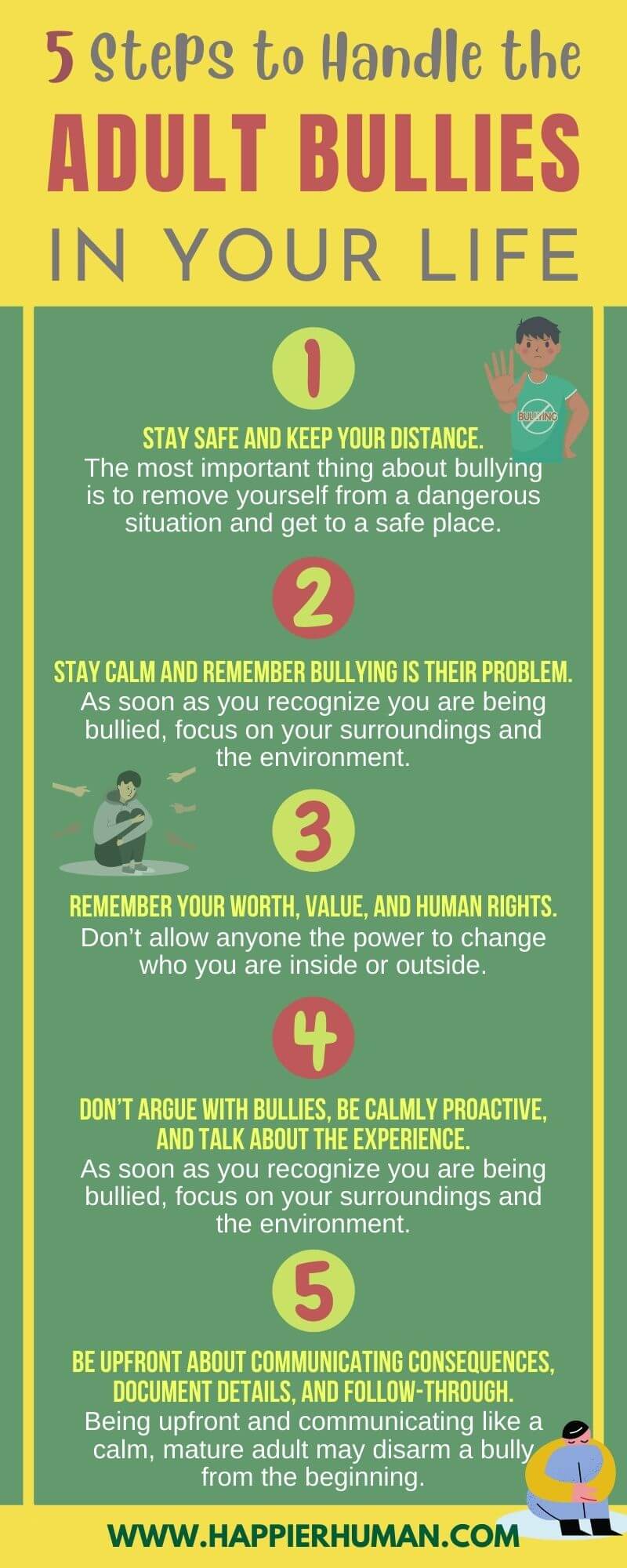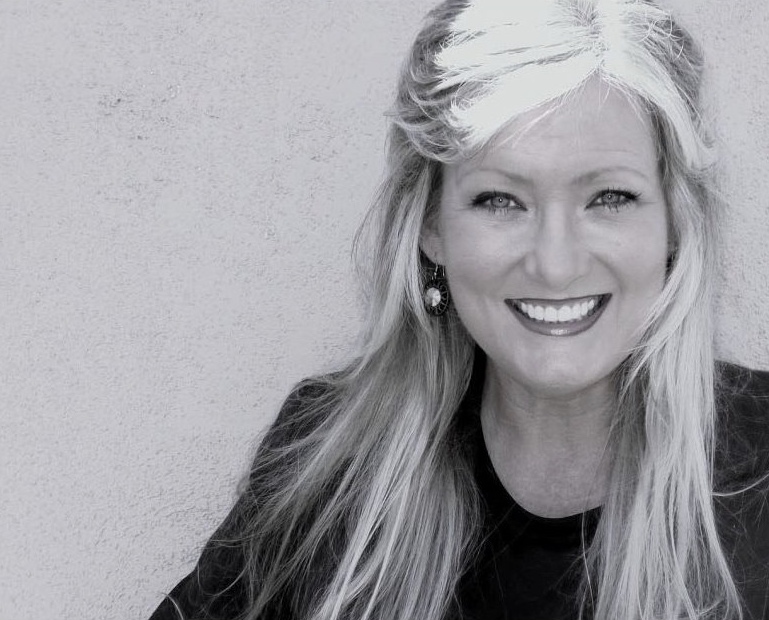Maybe your supervisor admonished you during a business luncheon, ridiculing and making fun of you.
Perhaps your mother pointed out errors of your opinion by rolling her eyes at your words or intentionally excluding you from a family gathering.
These are examples of adult bullying.
If you’re at a loss about how to handle the adult bullies in your life, hold onto your seat and take notes!
What are Adult Bullies?
Adult bullies are people who use harassment, intimidation and manipulation tactics to either get something they want or make themselves feel powerful and significant. They range from slight and menacing to detrimental and deadly.
To fully understand what adult bullies are, you must recognize:
So let’s dive right in, shall we?
The Difference Between Harassment and Bullying
The main difference between harassment and bullying is that harassment is illegal under federal laws, while bullying is not. For example, the Civil Rights Act of 1964 protects people from harassment and discrimination based on disability, race, gender, sexual orientation, skin color, age, religion, nationality, or religion.
On the other hand, bullying may be perceived as harmless, innocent, or playful with no aggressive display. If bullying does not fall under violation of harassment laws, it may be claimed as freedom of speech with no real threat to anyone’s well-being.
The Mental Implications of Harassment and Bullying
Behaviors or actions from harassment and bullying will leave you feeling pressured, shamed, oppressed, humiliated, intimidated, belittled, or fatigued. It may leave permanent emotional or psychological scars.
Harmful effects may even afflict bystanders who witness the harassment or bullying and may or may not have the means to step in and help. Innocent children often carry the wounds of observing adult bullying and abuse into adulthood. It may skew their perspective on life and relationships that never heals. This can also happen to adults.
Here are a few implications for victims of harassment or bullying:
In reviewing the mental implications of adult bullying, make sure to meditate, reflect, and do a self-inspection to ensure that you haven’t inadvertently become a bully yourself. If you’ve been bullied, it can sneak up on you and alter your perspective, personality, and behaviors. The biggest way to fight against bullying is to make sure you haven’t become one.
Tell-Tale Signs of Adult Bullies
Aggressive and passive-aggressive bullies display different sets of tell-tale signs that their tactics are about to escalate. To know the type you are dealing with, it is helpful to identify the indicators.
Aggressive Bullies
Passive-Aggressive Bullies
Types of Adult Bullies
There are at least five types of adult bullies. Since nearly 45% of Americans have experienced some form of adult bullying, the chances are high that you will experience this phenomenon at some point.
Here is a quick breakdown of the five types:
Why Bully?
The reasons adults bully are varied, innumerable, and challenging to pinpoint. Most appear to be psychologically based and developed over a long period of time.
These are a few reasons why adults bully:
Now, we will list five steps to handle the adult bullies in your life, so their behavior and actions don’t have to change your outlook on life. You have beautiful possibilities that lie ahead on your journey. Armed with knowledge and understanding, you can come out on top of any bullying situation.
5 Steps to Handle the Adult Bullies in Your Life
1. Stay safe and keep your distance.
The most important thing about bullying is to remove yourself from a dangerous situation and get to a safe place. If necessary, find support and protection through law enforcement, an emergency or crisis hotline, or local agencies. They can guide you on how to deal with a dangerous bully situation.
Here are a few resources to contact, if needed:
Don’t hesitate to contact someone if you feel you are in danger or the bullying has caused your mental health to deteriorate. No bully is worth the negative emotions you may be feeling.

Keeping your distance from adult bullies is the best option. Sometimes, it’s nearly impossible to gain enough distance, especially if you must work with them or they are close family members. That’s okay. There are several ideas to get the situation under control, so you don’t have to be abused.
2. Stay calm and remember bullying is their problem.
Bullying tends to ignite hot passions and uncontrollable emotions. As soon as you recognize you are being bullied, focus on your surroundings and the environment. Take a deep breath and remind yourself to stay calm.
Here are a few tips to keep your cool during a bully’s rant:
It takes more courage, strength, and integrity to remain calm during a bully’s attack. It takes maturity and intelligence to recognize that it isn’t worthwhile to participate in their bravado, no matter how subtle or belligerent.
3. Remember your worth, value, and human rights.
Just because a bully attacks you, whether aggressively or passive-aggressively, it doesn’t mean that your worth, value, or human rights have diminished. The bully hopes their behavior will make you believe it has, but it simply isn’t true. It’s all a façade, a game, a show.
Keep these facts in mind:
Don’t allow anyone the power to change who you are inside or outside. You are a vibrant, unique individual with a dazzling future ahead of you. Your life is a miracle. You are precious, and no one can take that away unless you allow them to.
4. Don’t argue with bullies, be calmly proactive, and talk about the experience.
There is a big difference between communicating clearly with adult bullies and arguing with them. Communication sends a message. Arguing engages.
Calm, transparent communication lets the bully know their behavior is recognized and what they will face if they don’t stop. It is a proactive measure to head off the incident before it goes too far.
Arguing is participation in the nonproductive banter of insults, excuses, intimidation, and humiliation. Arguing is never helpful. It only exacerbates the heated passions and potential fighting that may ensue.
Other things you can do to handle the act of bullying and your response:
Being calmly proactive is a huge step toward thwarting an adult bully’s mission to destroy. Upsetting your equilibrium and your world is precisely what they hope to accomplish. Often, when a bully realizes that their attack isn’t working, they will stop and move on.
5. Be upfront about communicating consequences, document details, and follow-through.
Being upfront and communicating like a calm, mature adult may disarm a bully from the beginning. It sometimes happens when they realize they are messing with someone out of their league. If not, the sudden recognition of their bullying behavior may be off-putting, so they stop.

“Firestarters” don’t like to be found out or confronted. It blows their cover and exposes their mission. Bullies expect that everyone will cow down to their demands with enough intimidation and authoritative messaging.
Clear and concise communication is key in any relationship. The same goes for a relationship or interaction with an adult bully. Arguing aside, telling a bully like it is often deters the behavior from continuing.
Final Thoughts on Adult Bullies
Unfortunately, adult bullies are everywhere. Whether they were created from hardships in life or an affliction of mental illness, they walk the planet with us.
However, bullies cannot exist without victims. You don’t have to be one of those. You can choose to have a higher understanding and overcome the bully’s immature behavior from the beginning.
It takes meditation, awareness, and thoughtful insight to deflect a bully’s attack. You have the power and strength to tackle it. And your training begins right here.
And if you think this bully might be also gaslighting you, then here are 15 strategies to turn the tables on the gaslighters in your life.

Rain Story is an author and screenwriter. She is an alumna of the University of Arkansas at Little Rock, the University of New Mexico, and the University of Kentucky. She earned two B.A.s and four years of graduate studies in literature, languages, and creative writing before personal tragedies pulled her away from her graduate work. She is also a Donaghey Scholar and fellow of the William G. Cooper, Jr. Honors Program in English.
Finally, if you want to increase your happiness and life satisfaction, then watch this free video that details the 7-minute habit for planning your day to focus on what's important.


